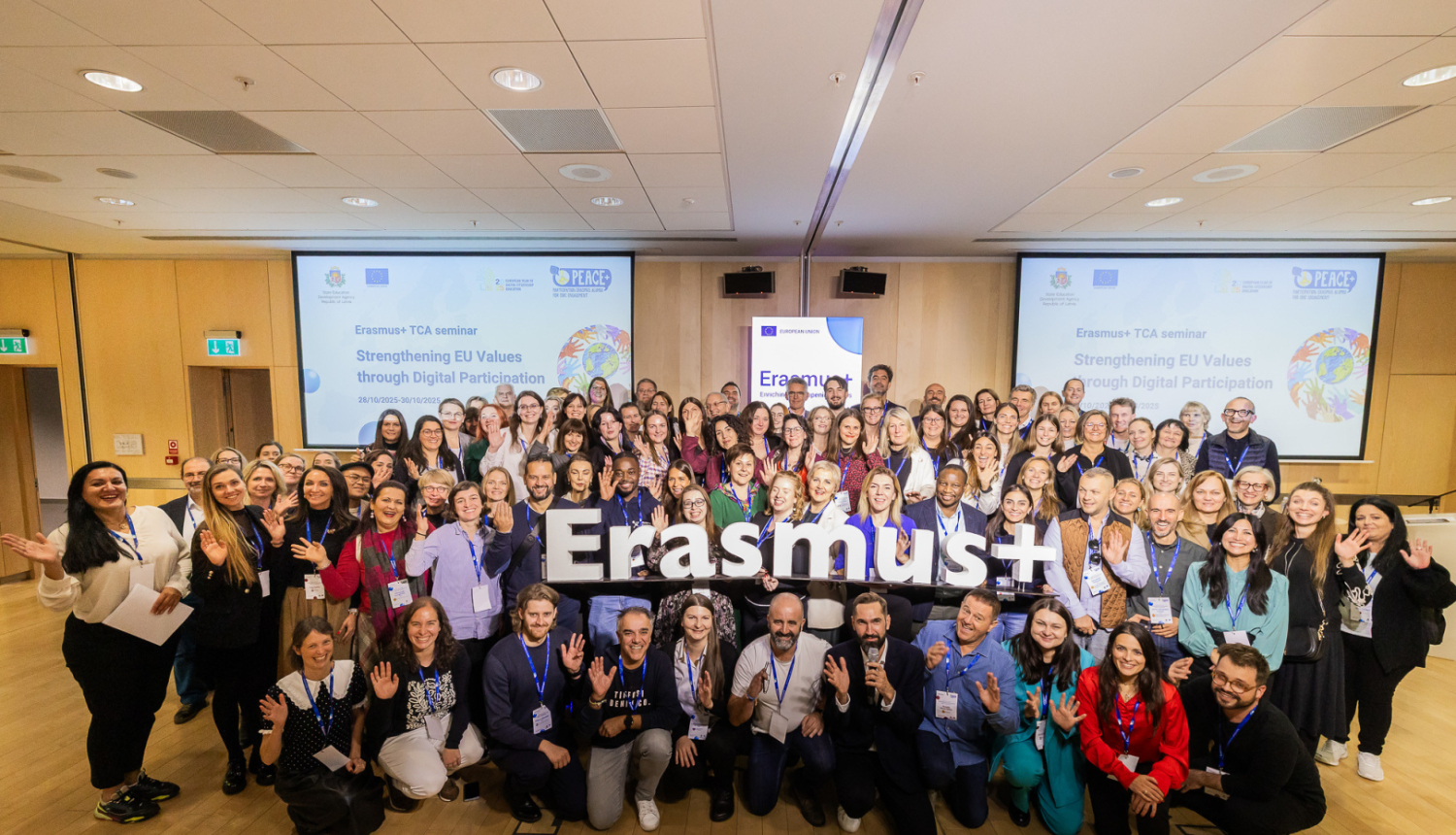Digital participation is increasingly becoming a new asset for strengthening EU values, given the many initiatives contributing to its development. But at the same time, in a society characterised by the ever-increasing use of AI, but also by fake news and infodemics, and where one of the challenges is also that of disconnection, the issue cannot be resolved with a click, but rather with informed choices. For this reason, the fundamental need remains the importance of developing critical thinking in citizens and young people, and the networking opportunities offered by the Erasmus+ Programme play a key role.
These are, in summary, some of the ideas that emerged during the international seminar Strengthening EU Values through Digital Participation, organised by the Latvian Erasmus+ Agency VIAA and held in Riga from 28 to 30 October 2025. A TCA–Training Cooperation Activities event, which was attended by around 120 participants from 23 countries, from the fields of higher education, school education, adult education and VET-Vocational Education and Training, discussed how to strengthen democracy, human rights and social equality in the digital age, using innovative tools and methods of participation. The Riga event was one of the stages of the 2025 long-term PEACE+ project, focusing on civic engagement and European values and coordinated by the INDIRE Italian National Agency.
The event was created to strengthen citizens’ engagement, promote democratic principles and European identity by encouraging active participation, digital engagement and the mobilisation of alumni networks. By combining citizenship education with digital tools, the aim of the international conference was to help shape more inclusive, democratic and digitally aware citizens, in line with the main objectives of the European Year of Digital Citizenship Education 2025.
Through expert-led discussions, interactive workshops and networking opportunities, participants had the chance to explore innovative ideas for promoting EU values and digital participation in their respective fields.
As Zane Gailīte, Director of the Erasmus+ Programme Department at VIAA, explained: «Digital participation is no longer just a topic for the future: it has become key to strengthening the values of the European Union, helping people to actively participate and feel like an integral part of the common European space. International events such as this one offer an opportunity to share experiences, learn from each other and create collaborations that inspire new solutions and common growth. For us, this seminar is not only about ideas, but also about the people who bring them to life. It is particularly gratifying that Latvia is becoming the place where European-wide projects are born and the feeling that together we can do more is strengthened».
During the three days (HERE is the full agenda), there were lessons, discussions and practical workshops on the challenges and opportunities of digital participation, the importance of media literacy, the impact of technology on social engagement, and digital wellbeing.
Particular attention was paid to examples of good practice and the exchange of experiences, as well as the creation of new ideas for collaboration between representatives of the education sector from different countries. In addition, participants had the opportunity to take part in a cultural visit to Latvia’s iconic National Library and the historic centre of Riga.
Among the speakers who contributed to the discussions on European Union values and digital participation Paul Blokker, Professor of Political Sociology at the University of Bologna, spoke about the importance of civic participation and active engagement in the context of EU values (HERE is a detailed REPORT, based on the contents of his speech), while researcher Cristina Bacalso addressed the challenges of participation in the 21st century. Ahmet Murat Kiliç, representative of the Council of Europe, spoke about the latest developments in digital citizenship education, and Yiannis Vacondios, Programme Manager, DG Education, Youth, Sport and Culture at the European Commission, explained the objectives and projects of Erasmus+.
All this with the aim of enriching the content of the seminar, while promoting international knowledge transfer and cooperation in the field of digital democracy.
Also worth mentioning are the parallel workshops on media literacy and digital participation, digital wellbeing and technological influences on engagement, as well as networking activities among the various participants.
The TCA in Riga concluded with the presentation of some good practices such as the Manabalss.lv project, which develops digital democracy tools, promoting citizen involvement in political decisions, and Signal Elections, an electoral simulation platform aimed at increasing active participation among young people, helping to educate informed and active citizens, thereby strengthening the foundations of a democratic society.




